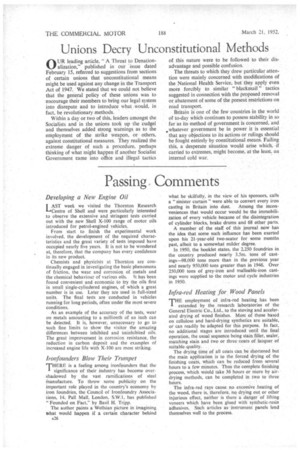Unions Decry Unconstitutional Methods
Page 28

If you've noticed an error in this article please click here to report it so we can fix it.
OUR leading article, "A Threat to Denationalization," published in our issue dated February 15, referred to suggestions from sections of certain unions that unconstitutional means might be used against any change in the Transport Act of 1947. We stated that we could not believe that the general policy of these unions was to encourage their members to bring our legal system into disrepute and to introduce what . would, in fact, be revolutionary -methods.
Within a day or two of this, leaders amongst the Socialists and in the unions took up the cudgel and themselves added strong warnings as to the employment of the strike weapon, or others, against constitutional measures. They realized the extreme danger of such a procedure, perhaps thinking of what might happen if another Socialist Government came into office and illegal tactics of this nature were to be followed to their disadvantage and possible confusion.
The threats to which they drew particular attention were mainly concerned with modifications of the National Health Service, but they apply even more forcibly to similar " blackmail " tactics suggested in connection with the proposed removal or abatement of some of the present restrictions on road transport.
Britain is one of the few countries in the world of to-day which continues to possess stability in so far as its method of government is concerned, and ,whatever government be in power it is essential • that any objections to its actions or rulings should be fought entirely by constitutional means. Failing this, a desperate situation would arise which. if carried to extremes, might become, at the least, an internal cold war.




















































































